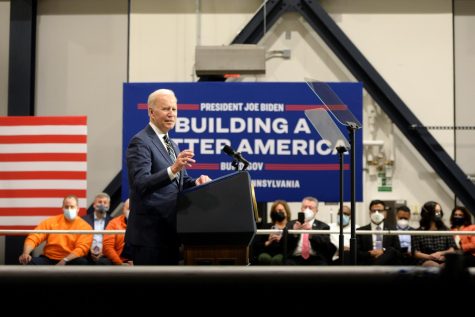Overdone themes an issue in “The Ides of March”
October 5, 2011
“The Ides of March” is a tired story of political treachery wrapped in a pretty package. The Ides of March
Director: George Clooney
Starring: Ryan Gosling, Philip Seymour Hoffmann, George Clooney
B-
“The Ides of March” is a tired story of political treachery wrapped in a pretty package.
Leading men George Clooney and Ryan Gosling serve as eye candy in a film that focuses on dirty politicians and little more. The film is George Clooney’s (“Up in the Air,” “Michael Clayton”) adaptation of Beau Willimon’s “Farragut North,” a stage play loosely based on Democratic presidential candidate Howard Dean’s 2004 primary campaign.
Set in the decisive swing state of Ohio, “Ides” follows Stephen Myers (Gosling of “Blue Valentine” and “Lars and the Real Girl”), a 30-year-old rising star on the campaign of Pennsylvania Gov. and Democratic presidential hopeful Mike Morris. Initially the consummate idealist, Myers works closely with his mentor Paul Zara — played by Philip Seymour Hoffmann (“Moneyball,” “Capote”) — in the most convincing and genuine performance of the film. Zara is Morris’ campaign manager and veteran political strategist.
Zara and Myers are Morris’ closest confidants and help him navigate the tumultuous terrain of college campus visits and debate speeches. This work is all in the name of obtaining the delegates needed to win over Ohio voters come election day. During the process, Myers is lured into a meeting with the campaign manager of Morris’ opponent, which ultimately leads to a domino effect of internal mistrust and betrayal, concluding with Myers being kicked off the campaign. More scandal ensues when Myers discovers a secret about Morris that breaks the last remaining shred of his political idealism and threatens to derail the entire campaign.
All of the plot twists and character development would ostensibly produce a quality plot, but “Ides” attempts to cram too much into its limited 101 minutes. This seems to be a symptom of a screenplay adapted from a stage play, as “Ides” is broken into too many scenes that rely on the actors’ performance and chemistry. As for chemistry, Gosling and Hoffmann are believable and compelling as friends-turned-conspirators — the hotel scene confirming Myers’ exit from the campaign is masterfully done. Paul Giamatti (“John Adams,” “Sideways”) and Clooney offer convincing portrayals as Tom Duffy, the rival’s campaign manager, and Morris, respectively.
Clooney continues to prove himself as an actor’s director, relying heavily on performances and dialogue. Clooney also adds plenty of gravitas with low-lit scenes and pensive profile shots: The peak of the exposition manifests itself as a dramatic backroom showdown between Myers and Morris in a toe-to-toe game of political chicken. Despite an exemplary cast and strong performances, Clooney’s own tendency to convey not-so-subtle subtext remains the most memorable part of “Ides.” Scenes of Morris promising “change” and the return of integrity to the Oval Office are too overhanded in their delivery. We are also left to wonder whether the pastel, retro-artistic signs advertising Morris could be traded for ones representing a certain 2008 presidential candidate.
In “Ides,” Clooney embraces a critique of a political landscape that is defined by gridlock, posturing and a lack of morality. It is a compelling position, yet it falls short. Myers’ transformation from idealist to cynic is forced and patronizing, leaving a sour taste of condescension about the Millennial Generation. Morris is the generic charismatic front-running candidate. Zara and Duffy — while played well — are still typical in demeanor and behavior. “Ides” simply does not take the audience anywhere it’s not already expecting to go. Indeed, the main drivers of the plot — corruption, betrayal and a sex scandal — are overdone and overstated in this film.
Politics is a dirty game played by people with sharp elbows — we don’t need George Clooney to teach us that.







